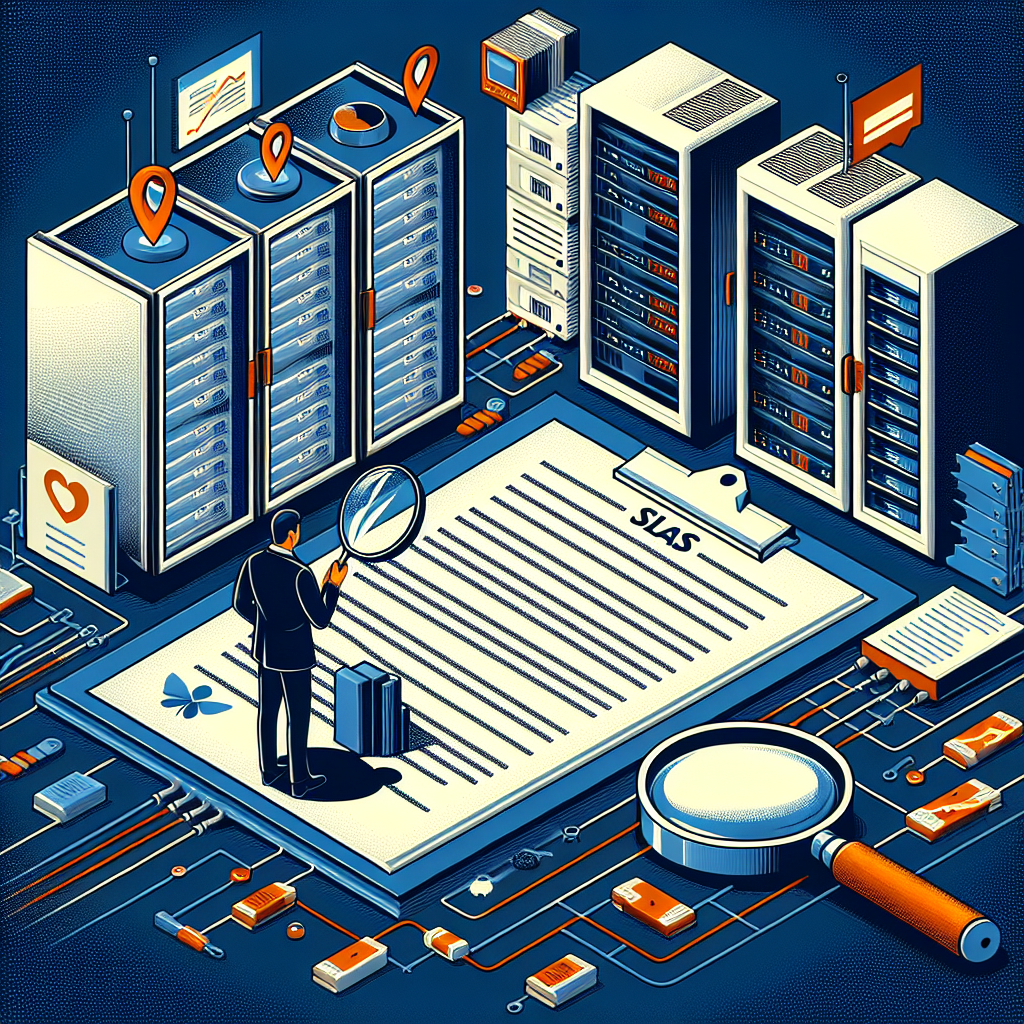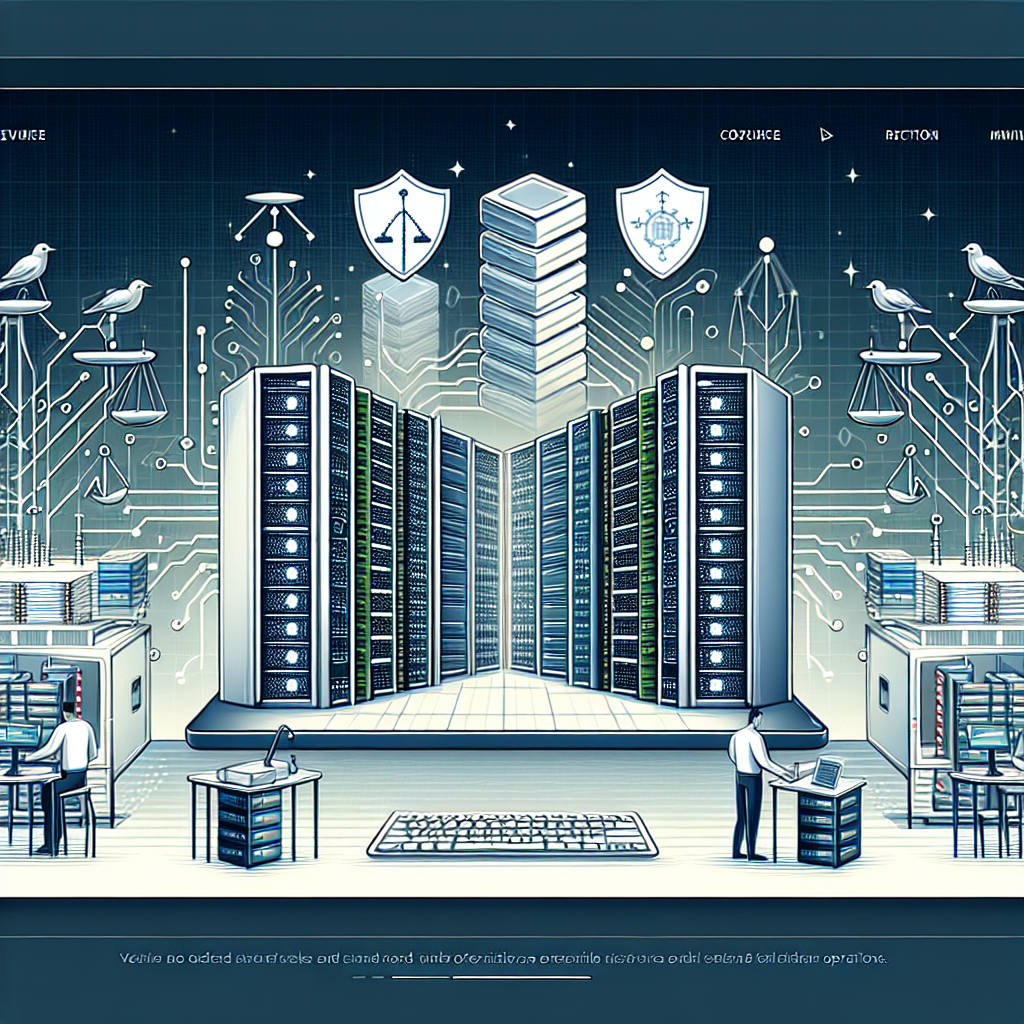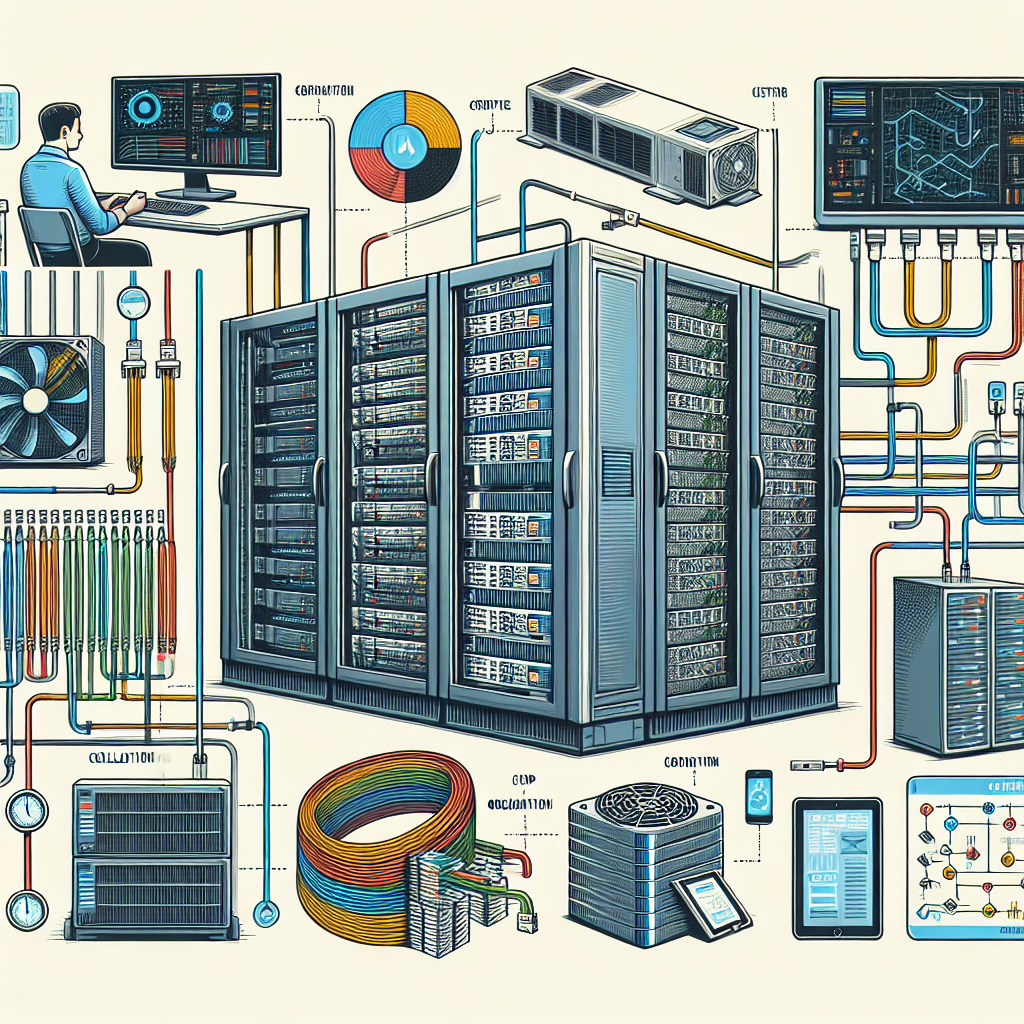Your cart is currently empty!
Tag: Operations

How Predictive Maintenance is Revolutionizing Data Center Operations
Data centers are the backbone of the digital world, hosting and managing the vast amounts of information that power our everyday lives. With the growing demand for data storage and processing, ensuring the smooth operation of these facilities has become more critical than ever.One technology that is revolutionizing data center operations is predictive maintenance. By leveraging advanced analytics and machine learning algorithms, predictive maintenance allows data center operators to anticipate and prevent equipment failures before they occur. This proactive approach not only minimizes downtime but also helps to optimize the performance and efficiency of data center operations.
Traditional maintenance practices are often based on a reactive model, where equipment is only serviced or repaired after it has already failed. This can lead to costly downtime, lost productivity, and increased risk of data loss. In contrast, predictive maintenance uses real-time data and historical trends to predict when equipment is likely to fail, allowing operators to take preventative actions to avoid disruptions.
One of the key benefits of predictive maintenance is the ability to extend the lifespan of critical equipment. By identifying and addressing issues early on, operators can reduce wear and tear on components, leading to improved reliability and longevity. This can result in significant cost savings, as the need for expensive repairs or replacements is minimized.
In addition to reducing downtime and prolonging equipment life, predictive maintenance can also help data center operators optimize their energy consumption. By identifying inefficiencies and areas for improvement, operators can make data-driven decisions to minimize energy waste and reduce operating costs. This not only benefits the bottom line but also contributes to sustainability efforts by lowering the carbon footprint of data center operations.
Overall, predictive maintenance is transforming the way data centers are managed and maintained. By harnessing the power of data analytics and machine learning, operators can proactively monitor and manage their facilities with greater accuracy and efficiency. As the demand for reliable and secure data storage continues to grow, predictive maintenance will play an increasingly important role in ensuring the smooth operation of data centers around the world.

Challenges and Solutions in Data Center IT Operations
Data centers play a crucial role in the functioning of modern businesses, as they house the infrastructure that supports the digital operations of organizations. However, managing and maintaining data center IT operations can be a daunting task, as it involves dealing with a myriad of challenges that can impact the efficiency and reliability of the data center. In this article, we will explore some of the common challenges faced by data center IT operations and discuss potential solutions to address them.One of the major challenges in data center IT operations is ensuring uptime and availability. Downtime can result in significant financial losses for businesses, as it can disrupt critical operations and lead to loss of revenue. To mitigate this risk, data center operators need to implement robust monitoring and alerting systems to proactively identify and address potential issues before they escalate into major outages. Investing in redundancy and failover mechanisms can also help to ensure continuous uptime and availability.
Another challenge in data center IT operations is optimizing resource utilization and efficiency. Data centers consume a significant amount of energy and resources, and inefficient utilization can lead to unnecessary costs and environmental impact. To address this challenge, data center operators can implement virtualization and consolidation strategies to maximize resource utilization and reduce energy consumption. Implementing energy-efficient practices, such as using energy-efficient cooling systems and optimizing airflow management, can also help to reduce operational costs and environmental footprint.
Security is another critical challenge in data center IT operations, as data centers store sensitive and confidential information that needs to be protected from cyber threats and unauthorized access. Data center operators need to implement robust security measures, such as encryption, access controls, and intrusion detection systems, to safeguard data and prevent security breaches. Regular security audits and penetration testing can help to identify vulnerabilities and strengthen the overall security posture of the data center.
Scalability and flexibility are also key challenges in data center IT operations, as businesses need to rapidly adapt to changing market conditions and technological advancements. Data center operators need to design and deploy a scalable infrastructure that can easily accommodate growth and expansion. Implementing modular and flexible architectures, such as software-defined networking and hyper-converged infrastructure, can help to simplify scalability and enable rapid provisioning of resources.
In conclusion, data center IT operations present a myriad of challenges that require careful planning and implementation of solutions to ensure smooth and efficient operations. By addressing challenges such as uptime and availability, resource utilization, security, and scalability, data center operators can enhance the reliability and performance of their data centers and support the digital operations of businesses effectively. Embracing innovative technologies and best practices can help to overcome these challenges and drive continuous improvement in data center IT operations.

How to Streamline Data Center Operations for Optimal Efficiency
In today’s digital age, data centers play a crucial role in storing, processing, and managing vast amounts of information for businesses of all sizes. However, as data continues to grow exponentially, data center operations are becoming more complex and challenging to manage efficiently. To ensure optimal performance and efficiency, it is essential to streamline data center operations. Here are some key strategies to help businesses achieve this goal:1. Consolidate and Virtualize Servers: One of the most effective ways to streamline data center operations is to consolidate servers and virtualize workloads. By reducing the number of physical servers in the data center and running multiple virtual servers on a single physical machine, businesses can optimize resource utilization, reduce energy consumption, and improve overall efficiency.
2. Implement Automation: Automation is a powerful tool for streamlining data center operations. By automating routine tasks such as provisioning, monitoring, and troubleshooting, businesses can reduce manual effort, minimize human errors, and increase operational efficiency. Automation tools can also help optimize resource allocation, improve scalability, and enhance agility in response to changing business needs.
3. Optimize Cooling and Power Management: Cooling and power are critical components of data center operations, as they account for a significant portion of energy consumption. To improve efficiency, businesses should optimize cooling systems by using energy-efficient cooling technologies, implementing hot and cold aisle containment, and maintaining proper airflow management. Additionally, businesses can reduce power consumption by implementing power management tools, using energy-efficient hardware, and adopting best practices for power distribution and redundancy.
4. Monitor and Analyze Performance: To streamline data center operations, businesses must continuously monitor and analyze the performance of their infrastructure. By collecting and analyzing data on key performance metrics such as server utilization, network traffic, and storage capacity, businesses can identify bottlenecks, optimize resource allocation, and proactively address issues before they impact performance. Monitoring tools can also help businesses track trends, forecast future capacity requirements, and make data-driven decisions to improve efficiency.
5. Implement Disaster Recovery and Business Continuity Plans: Data center downtime can have severe consequences for businesses, including lost revenue, damage to reputation, and potential legal liabilities. To ensure optimal efficiency, businesses should implement robust disaster recovery and business continuity plans to minimize downtime and ensure data availability in the event of a disaster. By establishing redundant systems, implementing data replication and backup strategies, and regularly testing recovery procedures, businesses can mitigate risks and maintain operational continuity.
In conclusion, streamlining data center operations is essential for businesses to achieve optimal efficiency, reduce costs, and enhance performance. By consolidating servers, implementing automation, optimizing cooling and power management, monitoring performance, and implementing disaster recovery plans, businesses can streamline their data center operations and position themselves for success in today’s competitive business environment.

How Data Center Service Level Agreements Impact Business Operations
In today’s digital age, data centers play a crucial role in ensuring the smooth operations of businesses. These facilities house and manage the vast amount of data that organizations generate and rely on to conduct their daily operations. In order to ensure that data centers operate efficiently and effectively, many organizations enter into service level agreements (SLAs) with their data center providers.A service level agreement is a contract between a service provider and a customer that outlines the level of service that is expected to be provided. SLAs typically include metrics such as uptime, response times, and performance benchmarks that the service provider is expected to meet. By establishing clear expectations and standards for service provision, SLAs help to ensure that data center operations run smoothly and that businesses have access to the data and resources they need to operate effectively.
One of the key ways in which SLAs impact business operations is by providing a framework for accountability. By clearly defining the expectations for service provision, SLAs create a mechanism for businesses to hold their data center providers accountable for meeting agreed-upon standards. This can help to prevent downtime and other disruptions that can have a negative impact on business operations.
SLAs also help to ensure that data center providers are incentivized to continually improve their services. By setting performance benchmarks and metrics for service provision, SLAs create a framework for data center providers to strive for excellence and continuously improve the quality of their services. This can lead to increased efficiency, reliability, and performance, all of which are critical for ensuring that businesses can operate effectively in today’s fast-paced digital environment.
In addition, SLAs can also help to mitigate risks and ensure that businesses have access to the resources they need in the event of a disaster or other unforeseen event. By including provisions for disaster recovery and backup services in SLAs, businesses can ensure that their data is secure and accessible even in the face of unexpected challenges. This can help to minimize downtime and ensure that businesses can continue to operate effectively even in the face of adversity.
Overall, service level agreements play a crucial role in shaping the relationship between businesses and their data center providers. By establishing clear expectations and standards for service provision, SLAs help to ensure that data center operations run smoothly and that businesses have access to the resources they need to operate effectively. By holding data center providers accountable for meeting agreed-upon standards and incentivizing them to continually improve their services, SLAs play a critical role in shaping the success of businesses in today’s digital age.

How DCIM is Revolutionizing Data Center Operations
Data center infrastructure management (DCIM) is a technology that is revolutionizing the way data centers operate. With the increasing demand for data storage and processing, data centers are becoming more complex and require a comprehensive solution to manage all aspects of their operations. DCIM provides a centralized platform that allows data center managers to monitor and control all aspects of their operations, from power usage to cooling systems and equipment maintenance.One of the key benefits of DCIM is its ability to provide real-time visibility into the data center environment. This means that data center managers can monitor and analyze the performance of their equipment and systems in real-time, allowing them to quickly identify and address any issues that may arise. This proactive approach to data center management can help prevent downtime and ensure that the data center operates at peak efficiency.
Another important feature of DCIM is its ability to optimize energy usage in the data center. By monitoring power usage and cooling systems, data center managers can identify areas where energy is being wasted and make adjustments to improve efficiency. This not only helps reduce operating costs but also reduces the environmental impact of the data center.
DCIM also offers tools for capacity planning, allowing data center managers to accurately forecast future growth and plan for the expansion of their data center infrastructure. This can help prevent overloading of equipment and ensure that the data center has the capacity to meet the growing demands of the business.
Overall, DCIM is revolutionizing data center operations by providing a comprehensive solution for managing all aspects of the data center environment. With its real-time visibility, energy optimization, and capacity planning tools, DCIM is helping data center managers improve efficiency, reduce costs, and ensure the reliability of their operations. As data centers continue to play a critical role in the digital economy, DCIM will be essential for ensuring their success in the future.

Mitigating Risks and Ensuring Resilience in Data Center Operations
In today’s digital age, data centers play a crucial role in the operations of businesses and organizations. These facilities house and manage huge amounts of data that are essential for everyday operations, making them a prime target for cyber attacks, natural disasters, and other risks that can disrupt operations and compromise sensitive information. To ensure the resilience of data center operations and mitigate potential risks, organizations must implement robust strategies and best practices.One of the key factors in mitigating risks and ensuring resilience in data center operations is having a comprehensive risk management plan in place. This plan should identify potential threats, vulnerabilities, and risks that could impact the data center and outline strategies to mitigate or eliminate them. Regular risk assessments should be conducted to identify any new threats or risks that may have emerged and to ensure that existing measures are effective.
Physical security is another crucial aspect of ensuring the resilience of data center operations. Data centers should be equipped with strong physical security measures, such as access controls, surveillance cameras, and security personnel, to prevent unauthorized access and protect against physical threats. Regular security audits should be conducted to identify any weaknesses in the physical security measures and address them promptly.
In addition to physical security, data centers must also have robust cybersecurity measures in place to protect against cyber threats. This includes implementing firewalls, intrusion detection and prevention systems, encryption, and regular security updates and patches. Employees should also receive training on cybersecurity best practices to reduce the risk of human error leading to security breaches.
Data centers should also have redundancy and failover mechanisms in place to ensure continuous operations in the event of a power outage, hardware failure, or other disruptions. This includes having backup power sources, redundant network connections, and failover servers that can quickly take over in case of a failure.
Regular testing and monitoring of systems and processes are also essential to ensure the resilience of data center operations. This includes conducting regular penetration testing, vulnerability assessments, and monitoring for any unusual activity or signs of a security breach. Any issues or vulnerabilities identified should be promptly addressed to prevent them from being exploited by malicious actors.
Overall, mitigating risks and ensuring resilience in data center operations requires a comprehensive approach that includes robust risk management, physical and cybersecurity measures, redundancy and failover mechanisms, and regular testing and monitoring. By implementing these best practices, organizations can minimize the risk of disruptions and data breaches and ensure the continuous and secure operation of their data centers.

Understanding the Benefits of Data Center Servicing: How it Impacts Business Operations
In today’s digital age, data centers have become an essential component of business operations. These facilities house the critical infrastructure that supports the storage, processing, and distribution of data for organizations of all sizes. As such, ensuring that data center equipment is properly serviced and maintained is crucial to the overall success of a business.Data center servicing involves regular inspections, maintenance, and repairs to ensure that all equipment is functioning properly and efficiently. This includes servers, storage devices, networking equipment, and cooling systems, among others. By investing in data center servicing, businesses can reap a number of benefits that directly impact their operations.
One of the key benefits of data center servicing is improved reliability and uptime. Downtime can be extremely costly for businesses, resulting in lost productivity, revenue, and customer trust. By regularly servicing data center equipment, businesses can minimize the risk of unexpected outages and ensure that their systems are running smoothly at all times.
In addition to improving reliability, data center servicing can also help businesses optimize their infrastructure for better performance. By identifying and addressing potential bottlenecks, inefficiencies, and other issues, businesses can ensure that their data center is operating at peak efficiency. This can lead to faster processing speeds, reduced latency, and improved overall performance for users.
Furthermore, data center servicing can also help businesses extend the lifespan of their equipment. By performing regular maintenance and repairs, businesses can prevent costly failures and extend the life of their hardware. This can help businesses save money in the long run by avoiding the need for premature equipment replacements.
Lastly, data center servicing can also help businesses stay compliant with industry regulations and standards. Many industries, such as healthcare and finance, have strict requirements for data storage and security. By maintaining a well-serviced data center, businesses can ensure that they are meeting these requirements and avoid potential fines or penalties.
In conclusion, understanding the benefits of data center servicing is crucial for businesses looking to optimize their operations and ensure the reliability and performance of their infrastructure. By investing in regular maintenance and repairs, businesses can improve uptime, performance, and reliability, while also saving money and staying compliant with industry regulations. Overall, data center servicing is a critical component of a successful business operation in today’s digital world.

Best Practices for Streamlining Data Center IT Operations
In today’s fast-paced and highly competitive business environment, data centers play a crucial role in ensuring the smooth functioning of IT operations. As the demand for data processing and storage continues to grow exponentially, it has become imperative for organizations to streamline their data center operations in order to maximize efficiency and reduce costs.Streamlining data center IT operations involves implementing best practices that help optimize resources, improve performance, and enhance overall operational efficiency. By adopting these practices, organizations can ensure that their data centers are capable of meeting the increasing demands of modern business operations.
One of the key best practices for streamlining data center IT operations is to implement virtualization technology. Virtualization allows organizations to consolidate their physical servers and storage devices into virtual machines, which can then be managed more efficiently. By virtualizing their infrastructure, organizations can reduce hardware and energy costs, enhance scalability, and improve overall resource utilization.
Another important best practice for streamlining data center IT operations is to automate routine tasks and processes. Automation can help eliminate manual errors, reduce the time required to perform repetitive tasks, and improve overall operational efficiency. By implementing automation tools and platforms, organizations can streamline their data center operations and free up their IT staff to focus on more strategic initiatives.
In addition, organizations should prioritize monitoring and performance management in order to proactively identify and address potential issues before they impact operations. By monitoring key performance indicators and utilizing advanced analytics tools, organizations can gain valuable insights into their data center operations and make informed decisions to optimize performance and resource utilization.
Furthermore, organizations should consider implementing a centralized management platform to streamline data center operations. A centralized management platform allows organizations to monitor and manage their entire data center infrastructure from a single interface, enabling them to quickly respond to incidents, allocate resources more effectively, and ensure high availability and reliability.
Overall, streamlining data center IT operations requires a holistic approach that encompasses virtualization, automation, monitoring, and centralized management. By adopting these best practices, organizations can optimize their data center operations, improve efficiency, and drive business success in today’s digital age.

Mastering Data Center Operations: A Comprehensive Training Guide
Data centers are the backbone of modern businesses, providing the infrastructure necessary to store, manage, and process vast amounts of data. As the demand for data center services continues to grow, the need for skilled professionals who can effectively manage and operate these facilities has never been greater. For those looking to enter this dynamic field or advance their career in data center operations, mastering the necessary skills and knowledge is essential.To help professionals navigate the complex world of data center operations, a comprehensive training guide has been developed to provide a roadmap for mastering the key concepts and best practices in this field. This guide covers everything from the basics of data center design and maintenance to advanced topics such as virtualization, cloud computing, and security.
One of the first steps in mastering data center operations is understanding the fundamental principles of data center design and layout. This includes learning about the different types of data centers, their components, and how they are organized to optimize performance and efficiency. By gaining a solid foundation in data center design, professionals can better understand how to troubleshoot issues, plan for future growth, and ensure the overall stability and reliability of the facility.
Once the basics of data center design are mastered, professionals can then move on to more advanced topics such as virtualization and cloud computing. Virtualization allows data center operators to maximize the use of their resources by creating virtual machines that can run multiple operating systems and applications on a single physical server. Cloud computing, on the other hand, enables businesses to access and store data and applications over the internet, eliminating the need for on-site servers and storage.
In addition to technical skills, data center operators must also be well-versed in security best practices to protect sensitive data and ensure the integrity of the facility. This includes implementing access controls, monitoring for suspicious activity, and regularly updating security protocols to defend against cyber threats.
To help professionals acquire the necessary skills and knowledge to excel in data center operations, a comprehensive training guide has been developed that covers all aspects of data center management. From basic principles to advanced topics, this guide provides a comprehensive overview of the key concepts and best practices in data center operations.
By mastering the skills and knowledge outlined in this training guide, professionals can position themselves for success in the fast-paced and ever-evolving field of data center operations. Whether you are just starting out in your career or looking to advance to a more senior role, this guide can help you build a strong foundation and achieve your goals in data center management.

The Importance of Vendor Management in Data Center Operations
In the world of data centers, vendor management plays a crucial role in ensuring smooth and efficient operations. With the increasing complexity of data center environments and the growing reliance on third-party vendors for essential services, effective vendor management has become more important than ever.Vendor management in data center operations involves overseeing the relationships with various vendors who provide services such as hardware and software maintenance, network services, security solutions, and other critical components of the data center infrastructure. By effectively managing these relationships, data center operators can ensure that their operations run smoothly, efficiently, and securely.
One of the key benefits of vendor management in data center operations is improved performance and reliability. By carefully selecting vendors that offer high-quality products and services, data center operators can ensure that their infrastructure is running at optimal levels. This can help minimize downtime, improve system uptime, and enhance overall data center performance.
Effective vendor management also helps data center operators reduce costs and maximize their return on investment. By negotiating favorable contracts and pricing agreements with vendors, data center operators can save money on hardware and software purchases, maintenance services, and other essential components of their infrastructure. This can lead to significant cost savings over time and help data center operators achieve their financial goals.
Additionally, vendor management plays a crucial role in ensuring data center security and compliance. By working closely with vendors to implement and maintain robust security measures, data center operators can protect their infrastructure from cyber threats and ensure compliance with industry regulations and standards. This is especially important in today’s increasingly interconnected and digitized world, where data breaches and security incidents can have far-reaching consequences.
In conclusion, vendor management is an essential aspect of data center operations that can have a significant impact on performance, reliability, cost savings, and security. By effectively managing relationships with vendors, data center operators can ensure that their infrastructure is running smoothly, securely, and efficiently. As data center environments continue to evolve and grow in complexity, the importance of vendor management will only continue to increase. Data center operators who prioritize vendor management will be better positioned to meet the challenges of the digital age and achieve success in their operations.
